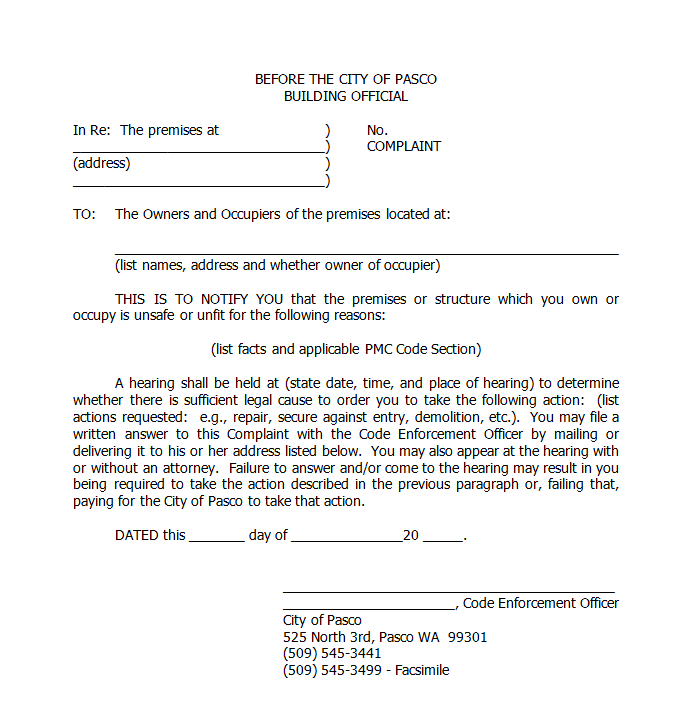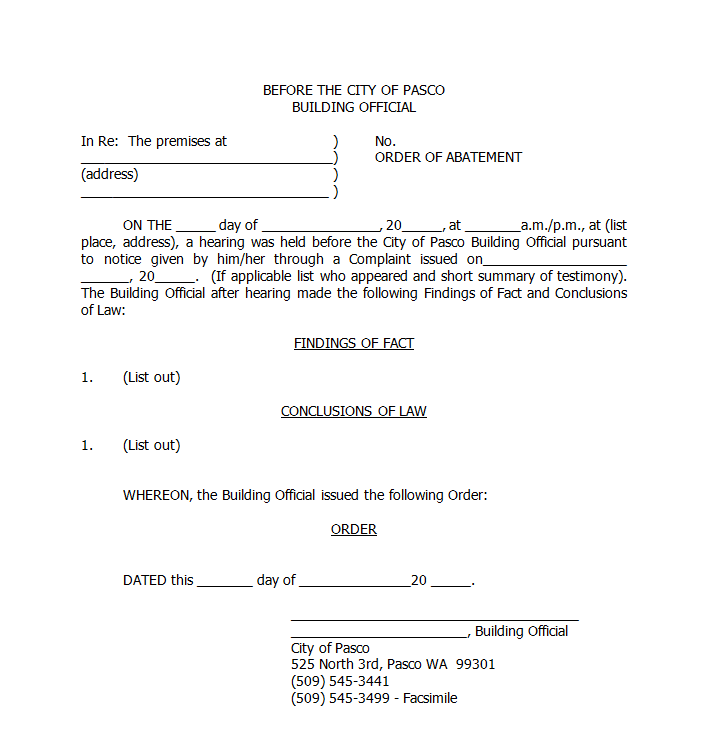16.70.050 Procedure to abate unsafe or unfit structures or premises.
(1) Complaint. If, after a preliminary investigation, the Code Enforcement Officer finds that any structure or premises is unsafe or unfit, he or she shall cause a written complaint to be served either personally or by certified mail with return receipt requested, upon all persons having any interest therein, as shown upon the records of the Franklin County Auditor’s office, and shall post the complaint in a conspicuous place on such property. The complaint shall state in what respects such structure or premises is unsafe or unfit as defined in this chapter and may include notice of additional penalties or remedies available to the City under other provisions of the Pasco Municipal Code. If the whereabouts of any of such persons are unknown and cannot be ascertained by the Code Enforcement Officer in the exercise of reasonable diligence, and the Code Enforcement Officer makes and files with the City Clerk an affidavit to that effect, then the serving of the complaint upon such persons may be made either by personal service or by mailing a copy by certified mail, postage prepaid, return receipt requested, to each such person at the address of the premises involved in the proceedings, and mailing a copy of the complaint by first-class mail to any address of each such person in the records of the County Assessor or County Auditor of Franklin County. The complaint shall contain a notice that a hearing will be held before the Code Enforcement Officer, at a place specified in the complaint, not less than 10 days nor more than 30 days after the serving of said complaint, and that all parties in interest have the right to file an answer to the complaint, to appear in person, or otherwise, and to give testimony at the time and place in the complaint. The rules of evidence prevailing in courts of law or equity shall not be controlling in hearings before the Code Enforcement Officer. A copy of the complaint shall be filed also with the Franklin County Auditor, and the filing of the complaint or order shall have the same force and effect as other lis pendens notices provided by law. The complaint shall be substantially in the following form:

Personal service upon an owner or other party in interest under this chapter may be made by delivering a copy of the complaint or order to that person or by leaving the copy with a person of suitable age and discretion at the place of residence of the owner or other party in interest. The Code Enforcement Officer shall make and retain written proof of service of the complaint.
(2) Determination – Reference to Building Code. As provided in RCW 35.80.030, the Code Enforcement Officer may determine that a structure or premises is unsafe or unfit if he or she finds that one or more defects or conditions exist that are described in PMC 16.70.030 (“unsafe or unfit”), according to minimum standards that are prescribed by the currently adopted version of the building code:
(a) For determining the fitness or safety of a dwelling for human habitation, or any building, structure, or premises for other use;
(b) For the use and occupancy of dwellings throughout the City; or
(c) For the use and occupancy of any building, structure, or premises used for any other purpose.
(3) General Standards. In general, the determination of whether a structure or premises should be repaired or demolished shall be based on the following standards:
(a) The degree of structural deterioration of the structure or premises; or
(b) The relationship that the estimated cost of repair bears to the value of the structure as determined by a qualified real estate appraiser engaged by the City for that purpose.
An undertaking entered into, at, or prior to the hearing, by a party in interest creates a presumption that the structure or premises can be reasonably repaired. The failure to accomplish such an undertaking is grounds for the Code Enforcement Officer to order demolition.
(4) Specific Standards for Determining Safety or Fitness – Demolition or Other Remedies.
(a) In reaching a judgment that a structure or premises is unsafe or unfit for human habitation, the Code Enforcement Officer shall consider:
(i) Dilapidation;
(ii) Disrepair;
(iii) Structural defects;
(iv) Defects increasing the hazards of fire, accidents, or other calamities, such as parts standing or attached in such manner as to be likely to fall and cause damage or injury;
(v) Inadequate ventilation;
(vi) Uncleanliness;
(vii) Inadequate light;
(viii) Inadequate sanitary facilities;
(ix) Inadequate drainage;
(x) Substandard conditions.
(b) If these or other conditions are found to exist to an extent dangerous or injurious to the health or safety of the structure’s occupants, or the occupants of neighboring structures or of other residents of the City of Pasco, and if (i) structural deterioration is of such degree that (A) vertical members list, lean, or buckle to the extent that a plumb line passing through the center of gravity falls outside the middle third of its base, or (B) 33 percent of the supporting members show damage or deterioration, or (ii) the estimated cost of restoration exceeds 60 percent of the value of the structure, or (iii) the structure has been damaged by fire or other calamity, the estimated cost of restoration exceeds 30 percent of the value of the structure and it has remained vacant for six months or more, the Code Enforcement Officer shall order the structure or premises demolished and the land suitably filled and cleared, or shall order the property immediately vacated and secured as completely as possible pending demolition. “Value” as used in this subsection shall be determined by reference to a current edition of “Building Valuation Data” published by the International Code Council or, if not published, as determined by the Code Enforcement Officer.
(5) Alternative Action. If by reason of any of the above conditions, a structure is unfit, but no public necessity is found for its immediate demolition, the Code Enforcement Officer may take other action, such as causing the property to be cleaned, cleared, vacated, secured, or otherwise repaired, which will promote the public health, safety, or general welfare.
(6) Findings and Order. If, after the required hearing, the Code Enforcement Officer determines that the dwelling or other structure or premises is unsafe or unfit for human habitation or that the structure or premises is unfit for other use, he or she shall make written findings of fact in support of that determination, and shall issue and cause to be served upon each owner and party in interest thereof, as provided in subsection (1) of this section, and shall post in a conspicuous place on the property, an order which (a) requires the owner or party in interest, within the time specified in the order, to repair, alter, or improve such dwelling, structure, or premises to render it fit for human habitation, or for other appropriate use, or to vacate and close the dwelling, structure, or premises, if that course of action is deemed lawful and reasonable on the basis of the standards set forth as required in subsections (3) and (4) of this section; or (b) requires the owner or party in interest, within the time specified in the order, to remove or demolish the dwelling, structure, or premises, if that course of action is deemed lawful and reasonable on the basis of those standards. An order may require the owner to take effective steps to board up or otherwise bar access to the structure or premises, if deemed necessary for public safety, pending further abatement action. The order may be in substantially the same form which appears below and may include notice of additional penalties or remedies available to the City under other provisions of this code.

If no appeal is filed as provided in this chapter, a copy of the order shall be filed with the Franklin County Auditor, and shall be a final order.
The Code Enforcement Officer shall make and retain a record of service, substantially in the form prescribed in subsection (1) of this section, with such modifications as may be appropriate.
(7) Abatement by City. If the owner, following exhaustion of his or her rights of appeal, fails to comply with the final order to repair, alter, improve, vacate, close, remove or demolish the dwelling, structure, or premises, or to take other required action, the Code Enforcement Officer may direct or cause such dwelling, structure, or premises to be repaired, altered, improved, vacated, and closed, removed, or demolished, and to take such further steps as may be reasonable and necessary to prevent access to the structure or premises, for public health or safety reasons, pending abatement. The Code Enforcement Officer, with the assistance of the City Attorney, may apply to the Superior Court for any legal or equitable remedy to enforce his or her order. [Ord. 4515 § 2, 2021; Ord. 4305 § 1, 2016; Code 1970 § 16.50.050.]